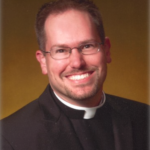9/23/2022
Preaching On Poverty… and Connecting with the Powerful
 Rich Andre, CSP
Rich Andre, CSP
September 23, 2022
 Rich Andre, CSP
Rich Andre, CSP
September 23, 2022
None of us ever know how our witnessing to the gospel will affect the world. We all plant “seeds” in the hearts of others that take time to germinate and grow. As a priest, I have the privilege of frequently talking with people who are now tending a beautiful tree that someone else planted in them 5, 10, or even 20 years ago!
I don’t know if the story I’m about to share is exactly a seed-being-sown example, but it’s definitely an incident about how a message I preached was magnified at least 30-fold by someone else:
Three years ago in Austin, TX, the Holy Spirit called me to preach about the city’s treatment of people suffering from homelessness. After all, if we pause to think about it, in this weekend’s gospel, the Parable of Lazarus and the Rich Man (Luke 16:19-31), Lazarus probably suffered from homelessness, too.
A few minutes into the first Mass that Sunday, I noticed some people standing in the back of the church who looked like security personnel. And indeed, an important visitor had come to Mass. I didn’t realize who she was until the end of communion. After Mass, this guest graciously shook my hand, thanked me for my words, and then she gave a speech at a fundraising breakfast, where she mentioned my homily on homelessness and the warm welcome she felt from the people of St. Austin Catholic Parish.
On any day, it would be a big deal for me to meet Nancy Pelosi and then have her mention my preaching in a speech. But on this particular weekend, it was even bigger news, because this was only 5 days after Pelosi had announced the first Congressional impeachment inquiry into a sitting U.S. president in 46 years. I never expected that the Austin American-Statesman’s lead story the next day, “Pelosi: ‘Trump gave us no choice,’” would include a brief interview with me!
Which brings us back to this weekend’s parable. Franciscan Richard Rohr argues that Jesus’ parables are part of mashal, Jewish wisdom literature. Rohr cites theologian Harvey Cox, who explains that another form of wisdom similar to a parable is a Zen koan. The difference? Cox says: “While the Zen stories aim at changing one’s perception of the world, Jesus wanted people to see that the world itself was changing, and that therefore, they had better change the way they looked at it. He invited them, in effect, to become part of the change.”
Has the world changed since the time of Lazarus and the rich man? There are still destitute people who struggle with hunger, illness, and homelessness, and there are still callous, wealthy individuals who ignore the suffering around them. The world has indeed changed. One of the reasons the early Church grew so rapidly was because Jesus taught and modeled what it meant to love our neighbors as ourselves. The early Christians took that seriously. Their whole world was re-oriented around self-giving love.
As followers of Jesus, we need to be part of that transformed world. We cannot be indifferent to those who suffer. We may each have different gifts and resources, and we may never know the full extent of the difference made by our advocacy and charity. Nevertheless, we must trust that God can find ways to magnify our actions as part of Christ’s reconciling the universe to its original purpose.